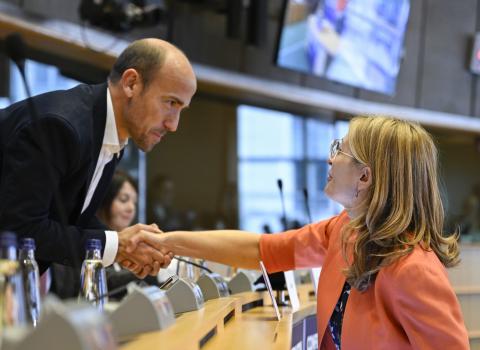Technology is no ‘magic wand.’ Insights are needed from other disciplines to make it relevant for citizens and to boost competitiveness

Photo credits: Possessed Photography / Unsplash
More than a dozen research lobby groups are urging Brussels and EU member states to better integrate social sciences and humanities in the next Framework Programme, FP10, to bring these disciplines to bear on policy ambitions.
“FP10 … has promising opportunities to build on the social sciences and humanities integration from the former programmes to strengthen the backbone of an innovative and competitive Europe,” the groups say in a joint statement. “However, evidence from the last two framework programmes shows that interdisciplinarity remains a challenge.”
While often marginalised, these disciplines provide critical insights into human behaviour, societal dynamics and cultural contexts, and they have the capacity to shape critical innovative processes and effective policies.
At the moment, the narrative around FP10 is dominated by its role in shaping European competitiveness. But to underpin competitiveness, there is a need to ensure attention is given to innovation in public administration, in legal frameworks, and in building and sustaining strong institutions, the statement says.
“This is the first time that we have so many organisations pulled together with an explicit social sciences and humanities angle,” Gabi Lombardo, director of the European Alliance for Social Sciences and Humanities, told Science|Business.
Rian Hesdahl, policy adviser at the Social Sciences and Humanities-council of the Netherlands, said that more horizontal integration and an increase in the budget would help set social sciences and humanities on a more equal footing with other disciplines and boost interactions with other themed clusters.
“Taking into consideration the impact innovation will have on our societies and markets is crucial, and therefore the innovation process should consider ethical, legal, behavioural, governmental, cultural, institutional, business, political, social-geographical dimensions,” Hesdahl explained to Science|Business.
“Adopting an interdisciplinary approach throughout the innovation process is necessary if you want to make sure that innovation successfully lands into our society and markets. And good innovation policy could facilitate or guide this process,” she added.
Social sciences and humanities expertise must be included to make sure that innovation benefits society rather than disrupts it. This expertise is also crucial to facing up to challenges like climate change. “Only a deep understanding of the roots of climate scepticism and the effect of climate change policies on societies can secure policies’ long-term impact,” the statement reads.
“You’re not going to use a magic wand to resolve the climate crisis,” Lombardo said. Instead, there are a number of “very human, social and political issues” to be addressed, such as the legal framework and social acceptance. It’s not a case of “more money here, or more money there,” but about assimilating technology as an instrument that supports an aim, instead of as an aim in itself.
Not a ready answer
The lobby groups are asking the European Commission and Parliament to put researchers “in the driving seat,” offering them a larger role in the decision-making that shapes FP10, and in particular the policy-driven clusters.
Hesdahl believes that social sciences and humanities experts could be better included in developing thematic topics, formulating call texts or evaluating research proposals, for example.
“Research is not there to make what you want … It’s not a ready answer,” Lombardo said. “Policymakers don’t always see where research might go; researchers tend to have a much longer-term view of what they invested their time and efforts in.”
Numerous organisations and specialists have shared their views on what Horizon Europe’s successor should look like.
In line with plans by President of the Commission Ursula von der Leyen to close the innovation gap with the US and China, Ekaterina Zaharieva, the new commissioner for Start-ups, Research and Innovation, has promised to streamline the access to EU research funding to shorten the application process and attract more new participants, like SMEs and start-ups.
“By including research actions, for instance, to complement research innovation actions within FP10, a better balance will be struck between open/bottom-up funding and challenge-driven/applied funding,” Hesdahl stated.
Lombardo hopes to create a social platform to discuss the needs of civil society. It has long been unclear where the contributions of social science and humanities research fitted into the bigger picture of supporting innovation, addressing societal challenges and promoting competitiveness, hence the need for policymakers to better grasp what this body of research is about, and where it can lead to.
“[FP10] is a research programme. It is meant to address research questions first, then policy,” Lombardo said. “We want a research framework that is fitter for researchers who are working on that, and fitter for the society we live in.”





 A unique international forum for public research organisations and companies to connect their external engagement with strategic interests around their R&D system.
A unique international forum for public research organisations and companies to connect their external engagement with strategic interests around their R&D system.